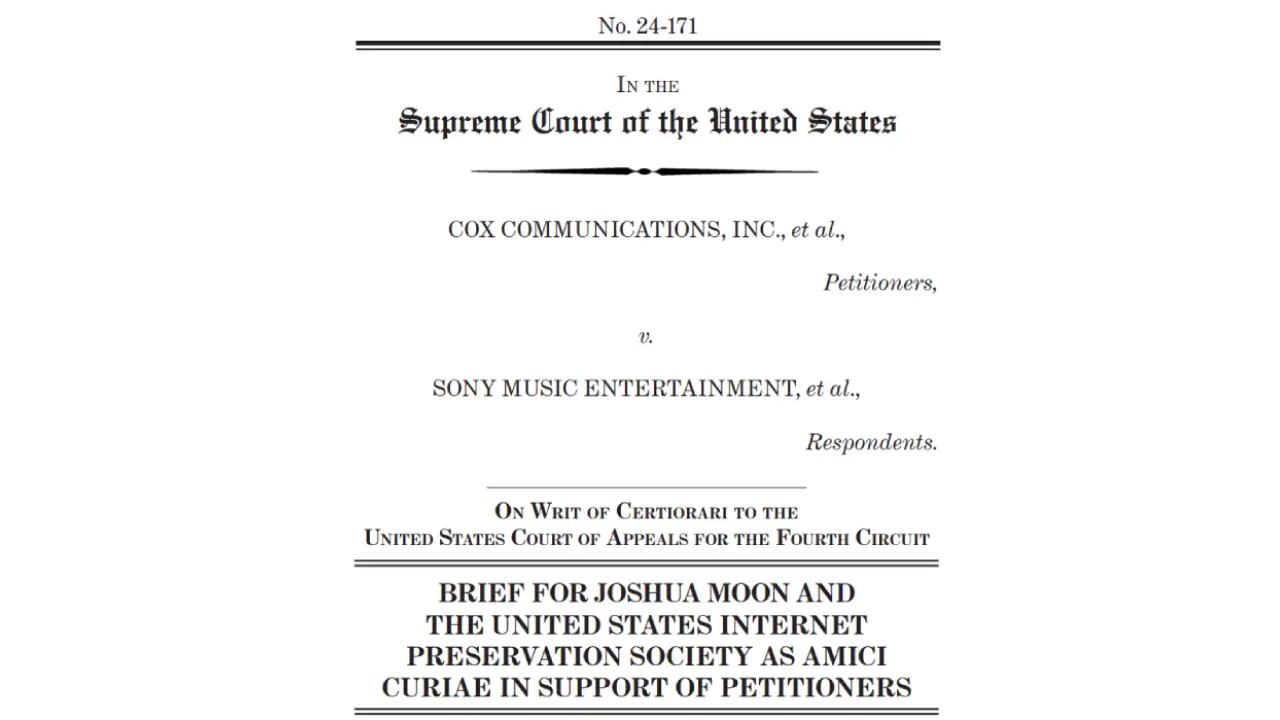The United States Internet Preservation Society (USIPS) has filed a crucial brief with the Supreme Court in Sony v. Cox. Our message is clear: current contributory copyright law imposes liability too broadly. This threatens how we all use the Internet. It stifles innovation, and limits vital online access for everyone.
Over the last 120 years, the courts of the United States have invented out of wholecloth the concept of vicarious liability (and then consistently expanded that liability that the courts themselves created). This doctrine is called "contributory copyright infringement." The legal theory holds in part that a company can be held liable for copyright infringement committed by its users, even if the company itself did not directly engage in any infringing activity. This is a significant departure from traditional notions of liability, which typically require some level of direct involvement or intent.
The rules around contributory copyright infringement have become increasingly complex and difficult to navigate, as happens with any tort created through judicial action instead of written law. In Sony v. Cox, the Supreme Court has the perfect opportunity to clarify these rules and set clear standards for when companies can be held liable for the actions of their users, or to throw out these invented rules entirely.
Without this clarity, the current precedent encourages zealous overcensorship to reduce liabilities, hindering progress in science and the arts, and contradicting the explicit purpose of the Copyright Clause.
To promote the Progress of Science and useful Arts, by securing for limited Times to Authors and Inventors the exclusive Right to their respective Writings and Discoveries (U.S. Const. art. I, § 8, cl. 8.)
Our arguments align with other key organizations pushing for a fairer Internet. Even the United States government believes that recent court decisions imposing contributory copyright liability are too broad and threatens innovation and free expression.
- X Corp. (formerly Twitter): Both USIPS and X Corp. emphasize that companies should only be liable for "active and culpable participation" in infringement, not for simply failing to stop it or for passive inaction based solely on knowledge. X Corp. warns that overbroad liability threatens free speech and innovation, noting that many infringement notices impact ordinary Americans posting everyday content.
- Electronic Frontier Foundation (EFF): EFF supports a stricter standard, calling for copyright liability to follow traditional patent law, which requires a "high level of intent" and "affirmative steps" to promote infringement. They agree that merely failing to terminate accounts is insufficient. Both USIPS and EFF also argue that the billion-dollar statutory damages awarded in this case are disproportionate and not tied to actual harm, warning that aggressive termination policies would cause "disproportionate harm to the public" by cutting off essential Internet access for innocent users.
- United States Department of Justice (DOJ): The DOJ agrees that the lower court's ruling on contributory infringement was wrong [25A, 38, 225]. They reinforce that liability requires "culpable intent" (an active desire for infringement to occur), not just passive knowledge or indifference. The DOJ also highlights that federal law (DMCA § 512(l)) explicitly states that not qualifying for a copyright safe harbor doesn't automatically mean a company is liable. Both USIPS and the DOJ caution that the current decision could lead to mass Internet service terminations, affecting countless innocent users.
We urge the Supreme Court to provide clear guidance that upholds fault-based liability and safeguards the fundamental role of the Internet in modern society.
The United States Internet Preservation Society (USIPS) is a 501(c)(4) nonprofit organization dedicated to restoring the Internet's position as a vibrant marketplace for the free flow of ideas, advocating for policies that promote innovation, free expression, and broad access to online information.
Contact: Joshua Moon <moon@usips.org> | Matthew Hardin <hardin@usips.org>


